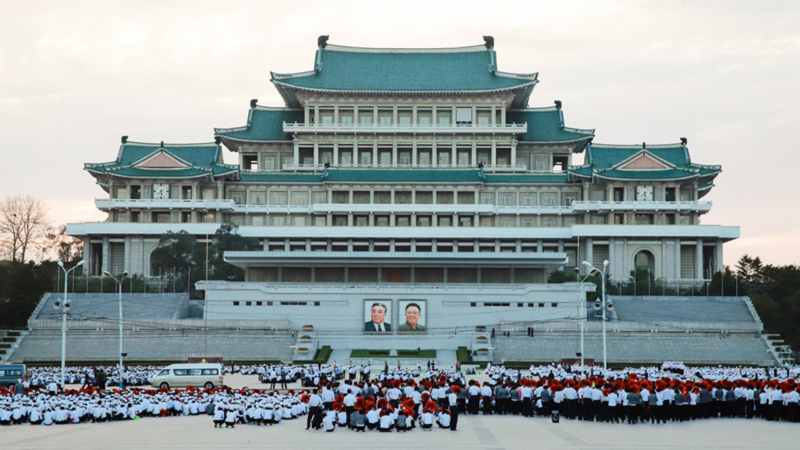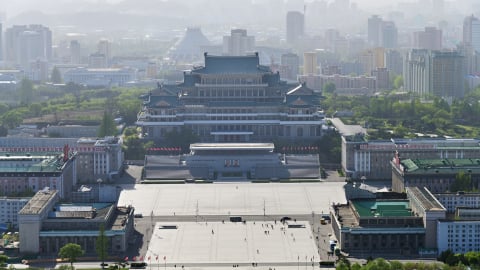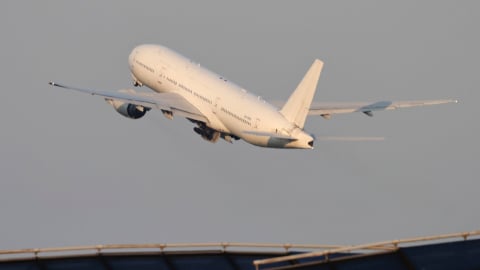A new painting from the East Sea
Located about 200 km southeast of the capital Pyongyang, Wonsan, once a summer resort for leaders, is now being developed into the Wonsan-Kalma International Coastal Tourism Zone, a symbol of the country's efforts to reposition its image in the eyes of the world.

A panoramic view of the Wonsan-Kalma resort on the azure coast of Wonsan. Photo: KCNA
The new tourism law, passed by North Korea's National Assembly in late October, designates this area as a key development zone. A Wonsan-Kalma Tourism Management Agency has been established, tasked with planning, licensing investments, managing tourism operations, and ensuring all activities are "in line with national interests."
The door opens within the established framework.
Under the new law, foreign investors will enjoy a range of special incentives: tax exemptions and reductions, the right to repatriate profits, long-term land lease rights, and opportunities for cooperation in sectors such as hotels, resorts, water sports, golf courses, and marinas. However, each project must undergo a meticulous approval process: from the building design and construction materials to the spatial layout, to ensure "harmony with the landscape and national values."
This is how North Korea is slowly "opening up," maintaining tight control but remaining flexible enough to attract international capital. Selected investors will serve as both partners and collaborators in building the nation's image.
Experience North Korean-style tourism.
If you ever arrive in Wonsan, international travelers will begin their journey at Wonsan-Kalma International Airport, a modern facility built over the past decade. From there, a coastal road stretching over 100 kilometers leads visitors through stretches of fine sand, verdant mountains, and emerging resorts.

North Koreans enjoy a holiday at Wonsan-Kalma beach, a coastal resort in the east. Photo: KNCA
However, tourism in North Korea has never been a journey of absolute freedom. Under new laws, tourists must register their temporary residence, travel within permitted areas, and are not allowed to leave tourist zones without the consent of a tour guide or authorities. Signal devices, personal internet connections, and photography in sensitive areas are all strictly controlled.
Instead of free exploration, the journey here is oriented towards a "guided" experience – where every moment is meticulously planned. But that's precisely what makes the trip different: travelers can sense a closed society gradually opening up, little by little, through the official perspective that the host country wants the world to see.
Preserving identity in every brick.
One notable aspect of the law is the requirement to preserve the natural landscape and showcase a "modern Korean spirit" in all tourist facilities. This means that, despite their international appearance, all architecture, from rooftops and gardens to performance areas, must retain traditional elements and avoid cultural dilution.
Art performances, cuisine, fashion, and even the way international guests are served must be approved to "reflect national dignity." The law also emphasizes not over-exploiting resources, not harming the marine environment, and not disrupting the lives of local residents. It can be said that North Korea is striving to build a "clean and orderly" tourism model, where landscapes and cultural identity are prioritized, rather than pursuing rapid, uncontrolled development.

Wonsan-Kalma isn't as bustling as Phuket, nor as vibrant as Busan. The sea here is a cool blue, the sky is misty, and the streets are devoid of tourists. Yet, within this tranquility lies an indescribable charm, a land where time seems to slow down, where humans and nature coexist in a perfectly arranged setting.

 VI
VI EN
EN

































